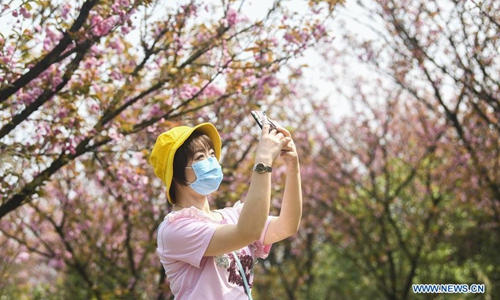Labor Day travel to triple that of early April
COVID-19 control still priority; full recovery of tourism won't come until October: analysts

Photo: Xinhua
The upcoming Labor Day holiday, which runs from May 1-5 this year, is expected to see the first holiday tourism peak in China this year in light of a much improved domestic COVID-19 situation, as the nation's major travel platform said some 90 million trips will take place, double the number during the Qingming Festival in early April.Observers were cautiously optimistic about the tourism sector's outlook, saying a rebound will be a positive sign for victory in China's pandemic battle, but travel activity will not return to normal until the National Day holiday in October.
According to a report online travel giant Ctrip sent to the Global Times on Wednesday, as of mid-April, big data on the platform showed that people planning to travel around the May holiday hit a record high since the COVID-19 outbreak began. The expected traffic volume will increase 353 percent, and the total number of trips will rise by 282 percent, compared with the beginning of April.
China Tourism Academy data showed that more than 43 million trips were made during the three-day Qingming Festival holiday in early April, generating a revenue of 8.26 billion yuan ($1.16 billion), an 80 percent drop year-on-year. Ctrip analysis predicts that travel volume during the Labor Day holiday will be double that during the April holiday, or even more. Local group travel bookings within travelers' home provinces are up160 percent.
It is reasonable for people, having stayed home for months, to make travel plans to cheer themselves up, and the significantly reined-in epidemic situation in China offers some reassurance, Li Mingde, a senior consultant with the center of tourism studies under the Chinese Academy of Social Sciences, told the Global Times on Wednesday.
But amid the pandemic and the fluctuating situation of COVID-19 in some domestic regions, some people are wary of cross-province travel, and most travelers plan to stay close to home.
Shanghai residents are most active in their plans to travel while the city is also expected to receive the most visitors. Beijing ranks seventh in terms of departures and third in terms of planned destinations, per the report. Beijing currently adopts the most stringent prevention measures with strict quarantine rules.
Li said the trend was reasonable as cross-region trips could lead to such problems as new quarantine periods.
Thailand news outlet The Thaiger reported that over half of Chinese surveyed expressed willingness to travel abroad some time in 2020, and more than 70 percent took Thailand into consideration. Thailand, which received 11 million Chinese among some 40 million foreign travelers in 2019, saw its tourism hit hard by the COVID-19 pandemic.
The situation may not ease so soon during the upcoming travel rush. Platforms do not have overseas itinerary booking services now, and analysts warn that even when the restriction loosens, the public should remain vigilant. Traveling abroad could be inconvenient for the traveler considering epidemic-control procedures and ruin the hard-won domestic battle against COVID-19, Li said.
China's Foreign Ministry on Tuesday urged citizens to refrain from going abroad, and to fully assess the serious risks of cross-infection and being stranded overseas.
To ensure that holiday trips take place in a secure and orderly fashion, the Ministry of Culture and Tourism and the National Health Commission released a notice on April 13, ordering that domestic tourism spots should only open outdoor areas and keep indoor venues closed.
Visitors admitted to a spot should not surpass 30 percent of its capacity, read the notice. Scenic spots were also told to establish and improve their reservation systems and implement time-slot scheduling rules.
Luo Yameng, a Beijing-based urban management expert, told the Global Times that the tourism industry's recovery is crucial to the country's economy in the post-epidemic period, but disease prevention and control remains a priority at the moment.
Therefore, regulations must be implemented strictly and violators must be punished severely, Luo said.
Visitors should assess the risks carefully and protect themselves through such measures as wearing face masks, especially at crowded areas. Li said. They may take them off in less crowded outdoor areas, he said.
Luo and Li predicted that the National Day golden week in October should be a safe and appropriate time for the tourism sector to resume normal operations.
They pointed out that the holding of the national "two sessions" could be a major sign to declare China's total victory over the coronavirus, and before that time, travel should be carried out with caution.

